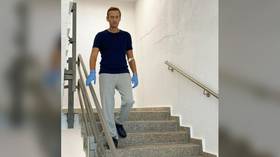Fake poisoning or genuine attempt? Russian TV documentary examines evidence of alleged attack on opposition figure Alexey Navalny

Did the Russian authorities try to poison Alexey Navalny, or is everything not as it seems? That's the question being posed in a new documentary examining the case's evidence, produced by well-known journalist Vladimir Solovyov.
Solovyov is best known for his talk show "Sunday Evening with Vladimir Solovyov," which airs weekly on state-owned TV channel Russia-1.
The first episode, released last week on the journalist's YouTube channel, discusses many aspects of the Navalny incident, including a recreation of various parts of the case.
Navalny, known best for his anti-corruption campaigns and YouTube videos, fell ill in August 2020 on a flight from Tomsk to Moscow. Following an emergency landing in the Siberian city of Omsk, he was immediately hospitalized. Two days later, after pleas from his wife Yulia, he was flown to Germany for treatment at Berlin's prestigious Charité clinic.
Also on rt.com Banning Navalny’s website is ‘unacceptable’ & officials are abusing power against opposition figures – Senior Russian CommunistShortly after, German authorities announced that the opposition figure was poisoned with a nerve agent from the Novichok group, a finding later reportedly confirmed by laboratories in both Sweden and France. Novichok first came to the general public's attention in 2018, when then-British Prime Minister Theresa May declared it "highly likely" that Moscow used the substance in an attempt to kill former Russian military intelligence officer Sergey Skripal.
However, according to Solovyov's show – called "Navalny: Fake Poisoning" – all might not be as it seems. The program attempts to debunk some of the theories proposed regarding the alleged attack. For example, the first episode includes Doctor Leonid Rink, one of the men who helped develop Novichok. According to Rink, the theory about Navalny's poisoning via tea makes no sense.
"Hydrolysis [the process by which water molecules break down chemical bonds] happens quite quickly in hot solutions," Rink said. "Probably, there wouldn't have even been enough time to get the tea to the target."
Rink has a controversial history, having reportedly been convicted for selling military-grade poison to criminals on the black market in a closed-door trial. He also has claimed that he has links to Russia's Federal Security Service, the FSB, saying that he sold rat poison to Chechen mobsters as part of a sting operation.
The program later cast doubt on the theory that Navalny was poisoned via a water bottle.
Rink also questioned the claim that Navalny was poisoned with Novichok at all, saying that his body, "alive or dead," would pose a threat to people around him, suggesting that others on his plane would also have been affected.
The documentary later tackles many other aspects of the case, including a claim that the Omsk Airport – where Navalny's plane landed – received a bomb threat. The host suggests that the bomb threat was a ruse designed to keep the aircraft in the air for as long as possible, to stop the opposition figure from getting any medical help.
The show interviewed numerous other people, such as Zoya Sovenko, who administered the initial medical care to Navalny; Ruslan Semashko, the chief of investigations at Tomsk Airport Police Station; and Alexander Sabayev, the head of the toxicology ward in Omsk where Navalny was treated. None of the opposition figure's associates, who all claim that he was poisoned with Novichok at the behest of the Russian authorities, were interviewed on the program.
In particular, Sabayev claimed that, if the Novichok story is true, the opposition figure should have died, because he was only administered with 3mg of atropine antidote.
Also on rt.com To be eligible for prisoner swap with US, Washington would have to confirm Navalny works for American intelligence, says KremlinLast September, shortly after the Navalny incident, Sabayev claimed that the deterioration of his health could be due to diet or fatigue, categorically rejecting any suggestions that toxic agents were found.
"If we were to use atropine as an antidote against an organophosphorus substance, the dose would have been 300-450mg," he said. "Without that, a poisoned patient usually dies within three to four hours after arriving at the hospital."
The show also points to lithium as a potential cause for Navalny's illness, implying that he may have been taking it as a mental health medication, noting that "Overdose may result in convulsions, confusion, fainting, coma and eventually death."
"I think lithium is the key to this whole story," host Alexander Sonovsky said, to conclude the show.
If you like this story, share it with a friend!












